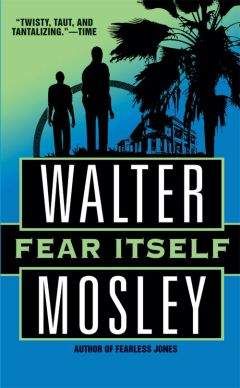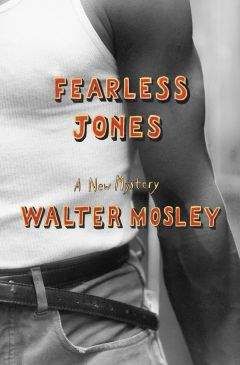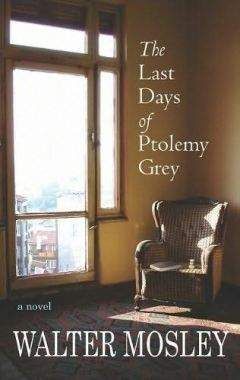Walter Mosley - The Long Fall
I find in my profession that it behooves one to appear ignorant, or, better yet, stupid, to the people you interrogate. It gives them a feeling of superiority, of having a mental leg up on you, so to speak.
“Have a seat, Mr. Trotter,” Gorling said. Then to the men in gray and white, “Wait for us outside.”
When the underlings had done his bidding, Gorling turned his throat to me.
“I have no idea what Mr. Sanderson’s sexual preferences are,” he said of his own volition.
I grimaced. “No? You see, these people hired me to find a reason for their son’s death. The cops don’t care because they got him on evidence. I thought maybe you guys up here would know something.”
Gorling had small hands. He raised them to indicate his helplessness.
“Willie was an employee, not a patient,” he lied.
“But the lady outside told me that he had been a patient before he got his job.”
“What lady?”
“The one with the pink parasol.”
I should have said “umbrella.” Better yet, I should have left the sheltering apparatus out completely. Using accurate language always puts people like Gorling on alert. I don’t even know if he realized it but his attitude toward me changed. His little face got rigid.
“Oh yes,” he said. “I had almost forgotten. That was so long ago, before my time.”
“What was his problem?”
“That’s a medical matter, Mr. Trotter. We are prohibited by law from giving out that kind of information.”
“You can’t even tell me if he was here because of the threat of violence?”
“I look at this institution less as a hospital and more like a university for the besotted and bemused,” he said with something like a smile. “The people here are learning their various lessons over and over, one step at a time. We coddle them and care for them, and never betray their trust.”
The alien hospital administrator blinked at me with smug satisfaction.
“So if I was to go to the Browns and tell them that their son was murdered by a man who had been put in here for manslaughter and then let out without the proper supervision, you wouldn’t open up your records like a dirty old man exposing himself to little kids on a crosstown bus?”
That pushed Gorling back into his chair.
“It’s not our responsibility to make a man take his medication,” he said.
“That, my friend, is for the lawyers to decide.”
This aggressive tactic was my second misstep. Gorling looked soft and corrupt but he had the reflexes and instincts of a club fighter. He wasn’t going to go down just because I showed him something. He was made from sterner stuff.
“Cedric!” he called out.
The two orderlies came immediately back into the room. They seemed ready to take physical action.
“I think it’s time that you leave these premises, Mr. Trotter,” Gorling said.
He stood up and, after a moment’s hesitation, I followed suit.
I didn’t like it but I had lost that particular bout. I had a few grains of knowledge, but without help I couldn’t make any sense of them.<£€ them.
GORLING AND HIS HENCHMEN walked me through the hall toward the front of the administration building. There were no patients and few employees there.
“You’ll find that threats don’t work on us out here, Mr. Trotter,” Gorling instructed as we went through the double doors out into the beautiful summer’s day. “This is a place where we help people. That given, we aren’t responsible for them after they leave our care.
“By the way, how did you get in here?”
“Told the guard that I was applyin’ for a job where I get to wear a gray T-shirt and cotton pants.”
“I’ll have to instruct him to keep a stack of application forms at the gate. Is your car in the lot next to the personnel building?”
“Sure is. Should I give one of your boys here my key so he can run and get it for me?”
I hated myself for underestimating Gorling. Sometimes being a New Yorker brought on a feeling of false superiority that made me slip up badly.
“That won’t be necessary,” Gorling said. “They will escort you to your car.”
I took a step down to the path, turned, and held out a hand like a good sport. Gorling didn’t want to touch me but that didn’t matter. When I looked up into his Adam’s apple I saw the dedication chiseled into the wall over the door: BRYANT HULL HALL.
Ê€„
36
On the way to the car my lighter-skinned brother put his hand on my shoulder. I stopped walking and he took a step to the side.
“Keep on movin’,” his partner commanded.
“Let’s get this straight, friends,” I said. “I’m leavin’ just like you want me to. But you don’t put your hands on me, understand? If you want me arrested, then call the cops. If you wanna throw down we can do it here and now. I might not beat the both of you but I swear that you’ll feel it for months.”
Maybe I sounded a little crazy, but this was damage control. I didn’t want them to get pushy with me, forcing a fight. Because I would have fought them, but what I really wanted was to make a beeline for the person who could help me decipher the clue.
SHE WAS A septuagenarian named Poppy Pollis who had once been the head of the whole library system but who now volunteered her time going through rare volumes and collections that were inherited from or donated by wealthy patrons.
I didn’t know Poppy’s name when I drove away from the sanatorium but a quick call to the information line of the local public library was all I needed. I identified myself, with the deft elocution of¦€… a university professor, as Jonah Rhinehart of Manhattan, explaining that I needed to speak with someone who had worked for many years in the system and who knew its history. The helpful librarian I spoke with said that there were three such individuals, though my best chance was with Ms. Pollis, who was working at the main branch on Washington Avenue.
Librarians are wonderful people, partly because they are, on the whole, unaware of how dangerous knowledge is. Karl Marx upended the political landscape of the twentieth century sitting at a library table. Still, modern librarians are more afraid of ignorance than they are of the potential devastation that knowledge can bring.
I went to the information desk on the first floor of the downtown branch and came upon a young black man wearing big round-lensed glasses and reading a small blue-gray book entitled Why Is There Something Rather Than Nothing? written by someone named Leszek Kolakowski.
“Good book?” I asked.
“Very good,” the young man replied, nodding sagely. “Very good.”
“I’m looking for Poppy Pollis,” I said, now that the quality of the philosophical monograph had been decided.
“Third floor,” he said.
I thanked him and went to look for the stairs.
POPPY WAS SEATED at a huge table piled high with musty old books. She was thin, probably tall, sporting short silvery hair and wearing a blue sweater that was buttoned to the throat. The air-conditioning was up too high.
“Are you Ms. Pollis?” I asked.
“Yes I am, young man.”
“Hi,” I said, taking the seat across from her. “My name is Peter Lomax. I’m a graduate student from New York and I’m doing a project, a master’s thesis at Brooklyn College on philanthropy.”
“How very interesting.” She didn’t question the fact that I was rather long in the tooth to be a graduate student. In 2008 the baby boomers, both black and white, were looking for an edge.
“Thank you. I think so, too. You know, our cities’ most valuable institutions are so dependent upon donations and yet there is so little work done understanding this infrastructure, this very personal, what should I call it . . . webbing of relationships.”
“Exactly so,” the elder exclaimed in a soft voice modulated by decades spent in silent reflection and examination. “Without entrepreneurship the libraries and other cultural institutions, such as museums and opera houses, would be lost.”
“That’s what I was thinking,” I said, matching her enthusiasm with my own. “I know that every relationship developed in a system such as this one is personal, but I wanted to look at the different «€the diffkinds of giving.”
Poppy took off her glasses to underscore her interest.
“Like you, for example,” I said. “You must have had to develop all kinds of relationships in order to keep the doors of this system open.”
She nodded, maybe even misted up a little.
“It was hard work but I loved every moment of it.”
“Yes. I know it must have been both difficult and rewarding. I’m also aware that you can’t reduce a lifetime of experience into some equation to be passed on but . . . I was thinking of approaching the problem by looking at philanthropy and separating what they call old money from the nouveau riche.” I figured that my target was most likely the former.
“How interesting,” Poppy Pollis said. “That really is the major concern, you know. People just coming into their wealth are looking for a place among the wealthy, for recognition, whereas the old families have a traditional format that allows them to maintain their names, as it were . . .”
She went on to tell me that there were twelve important families in Albany’s history. Really there were only eleven but the society page had added the Sampson clan. Poppy considered the Sampsons a Johnny-come-lately bunch of car salesmen, but the newspaper people liked the idea of an even dozen so the Sampsons were included.
I had to sit through a lot of useless information, asking questions that I didn’t care about. I had my notebook, though, and took very complete notes. It was maybe forty minutes later when we came upon the Hull family.
According to Poppy, the Hull clan was, on the whole, a dynasty of debauchery. Maxim Hull was the great-grandfather. He helped to build the infrastructure of the modern Albany library system. It was said that he made his fortune as a bootlegger and smuggler along with Joe Kennedy back in the era of Prohibition. He also built the second-largest Protestant church in the city.
Maxim’s son, Roman, had always felt that he lived in the shadow of his father and tried to outdo him in every way that he could. At the age of fifty-eight he shot and killed an up-and-coming young race car driver, was deemed insane, spent four years at the Sunset Sanatorium, got out, and proceeded to marry the driver’s young widow. The marriage didn’t last but the memory of the scandal certainly did.
Bryant, Roman’s son by a previous marriage, was presented as the current head of the family. As far as anyone knew he was an upstanding citizen. He built the administration building at the Sunset Sanatorium, married an older woman named Axel or Jack-son or something, and had raised two beautiful children—Hannah and Fritz.
“Was the wife’s maiden name Paxton?” I asked, pretending to be looking up a note.
“I don’t remember exactly what it was, but I’m sure it wasn’t Paxton,” she said. “Why do you ask?”
“Of course I knew about the Hull family,” I said. “I thought that Bryant had married a woman named Paxton. I guess I was mistaken.”
Ê€„
37
There was a bank of public-access computers on the first floor of the library. It was easy for me to look up society page newspaper articles, which finally gave me the location of the Hull residence. The family mansion was on a private road, Road Royale, thirty-five minutes north of the city.
Getting to the entrance of the road took forty minutes from the library parking lot.
I told the guard that I was delivering an envelope for Mr. Hull from a man named Jacobi, one of The Twelve, as Poppy Pollis called them.
The guard wasn’t very concerned, and I saw why when I had driven about three miles down the pastoral country road. The Hull home was protected by a fourteen-foot-high electrified black iron gate that was topped with razor wire. It looked like the domain of a wealthy Third World oppressor, not the second cousins of the tyrant but the thing itself.
I stopped at the front gate and pressed a coral-colored button.
It was a beautiful day. Birds were chattering and the clouds hung around gracefully appreciating the deep wood as they basked in the rising heat.
“Yes?” a young voice asked over the intercom.
“Leonid McGill for Bryant Hull,” I shouted. I always shout when speaking into intercoms.
I was expecting another question but instead the gate rolled to the side as if my coming were prophesied in one of Poppy Pollis’s old books of Albany lore.
The house was a letdown. I was expecting a Russian battleship replete with cannon and high metal buttresses but it was just a house; a big house, a very big house—a mansion in fact. It was four stories and took up the space of half a city block but my imagination had led me to expect so much more.
It was an old structure built from gray stone—intended to last. The front door was set back on a large green porch that was lined with twelve-foot pillars of white marble. Walking toward that door, it felt as if I were walking into the maw of a great gray and toothed toad.
I RANG THE BELL and waited for a while. The front door was at least fourteen feet high and eight wide. A big brass doorknob was in the lower center space. I had been standing there for maybe three minutes when the huge plank finally swung open.
“Yes?” the fair-skinned, russet-haired girl-child said. I knew her face from the articles I had perused at the library, which her great-grandfather had helped to build. From my reading I knew that she was twenty years old. Hannah could have passed for fifteen but she ®€…had none of the awkwardness of an adolescent.
When she looked at me she caught sight of something that was a part of her imagination. She smiled at the phantom I represented as I grinned at her beauty.
“Leonid McGill,” I said.
“May I help you?”
“I wanted to see your father, Hannah,” I said.




